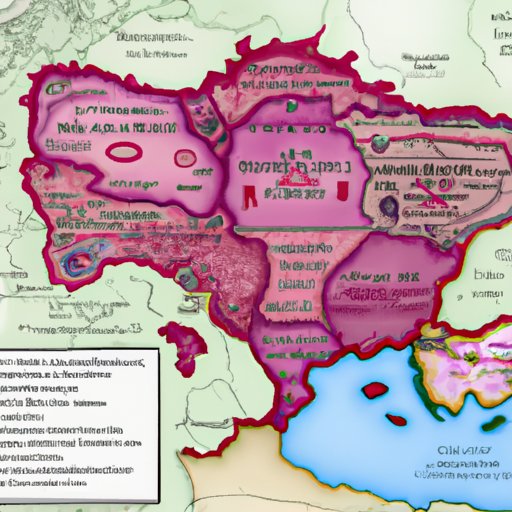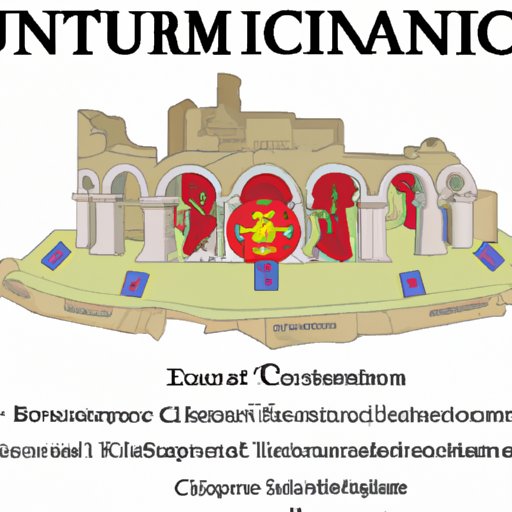Introduction
Justinian (482-565 AD) was the Eastern Roman Emperor from 527-565 AD, ruling over the Byzantine Empire during its height of power and influence. He is remembered for his ambitious reforms and vision for the future, which helped to shape the political and social landscape of Medieval Europe. But was he a great leader? In this article, we’ll explore Justinian’s accomplishments and assess whether he is deserving of his reputation as one of history’s greatest rulers.
Examining Justinian’s Legacy: A Look at His Contributions to Leadership
Justinian is often hailed as one of the most influential leaders in European history. He was a visionary ruler whose bold reforms had far-reaching effects on the Byzantine Empire and beyond. Let’s examine some of Justinian’s key contributions to leadership.
His Vision and Reforms
Justinian was an ambitious leader who had a clear vision for the future of the Byzantine Empire. He set out to restore the former glory of the Roman Empire by expanding its borders, reforming the law, and strengthening the state. To achieve these goals, he instituted a number of sweeping reforms, such as the Codex Justinianus, a comprehensive collection of Roman law that served as the basis for many legal systems in Europe for centuries to come. He also implemented a series of administrative reforms, such as the creation of a centralized bureaucracy that gave the emperor more direct control over the empire.
His Impact on Byzantine Politics
Justinian’s reforms had a lasting impact on Byzantine politics. He established the autocratic form of government that would remain in place until the fall of the empire in 1453. He also strengthened the military and increased the empire’s power through his conquests, which extended its borders to include much of North Africa and the Middle East. Justinian’s reign saw the rise of Constantinople as the center of the Byzantine world, with its court becoming a major cultural hub.
Analyzing Justinian’s Successes and Failures as a Leader
Justinian’s reign was not without its failures, but overall he was successful in achieving his goals and leaving behind a lasting legacy. Let’s take a look at some of his successes and failures as a leader.
Successful Policies and Ideas
Justinian’s most notable successes were his reforms, which laid the foundation for the Middle Ages. He restored order to the legal system with the Codex Justinianus, which provided a unified code of laws for the entire empire. He also reformed the taxation system and made it fairer for all citizens. He also improved the economy by encouraging trade and commerce, and he established Constantinople as the center of the Byzantine world.
Unsuccessful Attempts and Mistakes
Despite his successes, Justinian’s reign was not without its failures. His aggressive foreign policy led to costly wars and overextended the empire’s resources. He also failed to address the growing problem of religious tensions between Christians and non-Christians in the empire. Finally, his heavy-handed approach to governing alienated many of his subjects, leading to popular unrest and revolt.
The Impact of Justinian on Medieval European Politics
Justinian’s reforms had a profound effect on Medieval European politics. His expansion of the empire promoted cultural exchange between Europe and the Middle East, while his legal reforms strengthened the rule of law and set the stage for the development of modern democracies. His efforts to unify the empire under a single code of law also laid the groundwork for the establishment of the Holy Roman Empire.
Expansion of the Empire
Justinian’s military campaigns extended the boundaries of the Byzantine Empire, making it the largest and most powerful state in Europe at the time. This expansion promoted cultural exchange between the Middle East and Europe, which had a profound effect on the development of art, architecture, and culture in the Middle Ages.
Strengthening of the Law
Justinian’s most important contribution was his codification of Roman law. The Corpus Juris Civilis, or Code of Justinian, was a comprehensive collection of Roman law that served as the basis for many legal systems in Europe for centuries to come. This code helped to establish a uniform system of justice throughout the empire and laid the groundwork for the development of modern democracies.

Justinian and the Byzantine Empire: Exploring His Role in Strengthening the State
Justinian was an able administrator and skilled politician who sought to strengthen the Byzantine Empire. Let’s take a closer look at his political tactics and administrative abilities.
His Political Tactics
Justinian was an astute political operator who used propaganda and patronage to maintain his power. He also relied heavily on his advisers and relied on them to implement his policies. He was also a master of intrigue, often using spies and informants to gain information about his enemies.
His Administrative Abilities
Justinian was an effective administrator who was able to effectively manage the vast bureaucracy of the Byzantine Empire. He reduced corruption and improved efficiency by introducing new systems of taxation and by streamlining the government’s bureaucracy. He also encouraged trade and commerce, which helped to bolster the economy.
Justinian’s Reforms: How They Shaped the Law and Society of Late Antiquity
Justinian’s legal reforms had a lasting impact on the law and society of late antiquity. Let’s take a closer look at some of his changes.
Changes in Roman Law
Justinian’s most significant contribution was his codification of Roman law. The Corpus Juris Civilis, or Code of Justinian, was a comprehensive collection of Roman law that served as the basis for many legal systems in Europe for centuries to come. This code helped to establish a uniform system of justice throughout the empire and laid the groundwork for the development of modern democracies.
Impact on Social Structures
Justinian’s reforms also had a profound impact on the social structure of the Byzantine Empire. His reforms encouraged the growth of cities and towns, which increased social mobility and helped to break down the traditional class divisions. His edicts also granted greater rights to women and children, giving them more autonomy and protection under the law.
Justinian’s Vision: How He Set the Stage for the Middle Ages
Justinian was a visionary ruler whose bold reforms had far-reaching effects on the Byzantine Empire and beyond. His legacy is still felt today in the form of legal codes that have formed the basis of many modern democracies. His reign set the stage for the Middle Ages and helped to shape the political and social landscape of Medieval Europe.
The Legacy He Left Behind
Justinian left behind a legacy of reform and progress that has had a lasting impact on the world. His legal reforms established a uniform system of justice that has been adopted by many modern democracies. His expansion of the Byzantine Empire promoted cultural exchange between Europe and the Middle East, while his administrative reforms helped to strengthen the state. His vision for a unified empire helped to pave the way for the establishment of the Holy Roman Empire.
His Place in History
Justinian’s reign marked a turning point in European history. He was a visionary leader whose bold reforms had far-reaching effects on the Byzantine Empire and beyond. He is remembered as one of history’s greatest rulers and his legacy lives on in the form of the legal codes and institutions he created.
Conclusion
Justinian was a great leader and visionary ruler whose reforms shaped the course of European history. His legal reforms established a uniform system of justice and laid the groundwork for the development of modern democracies. His expansion of the Byzantine Empire promoted cultural exchange between Europe and the Middle East, while his administrative reforms helped to strengthen the state. Justinian’s reign set the stage for the Middle Ages and helped to shape the political and social landscape of Medieval Europe.
(Note: Is this article not meeting your expectations? Do you have knowledge or insights to share? Unlock new opportunities and expand your reach by joining our authors team. Click Registration to join us and share your expertise with our readers.)
